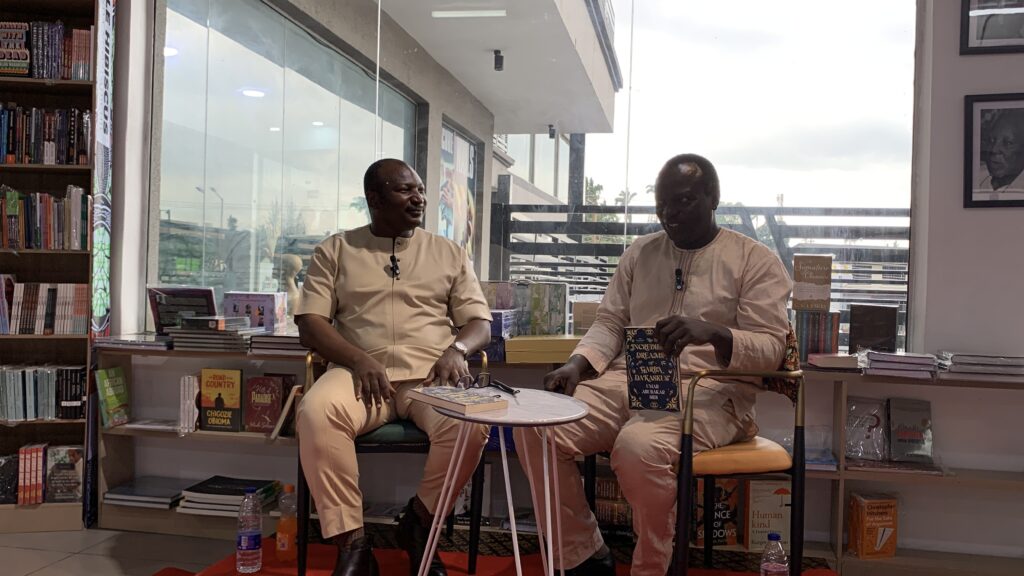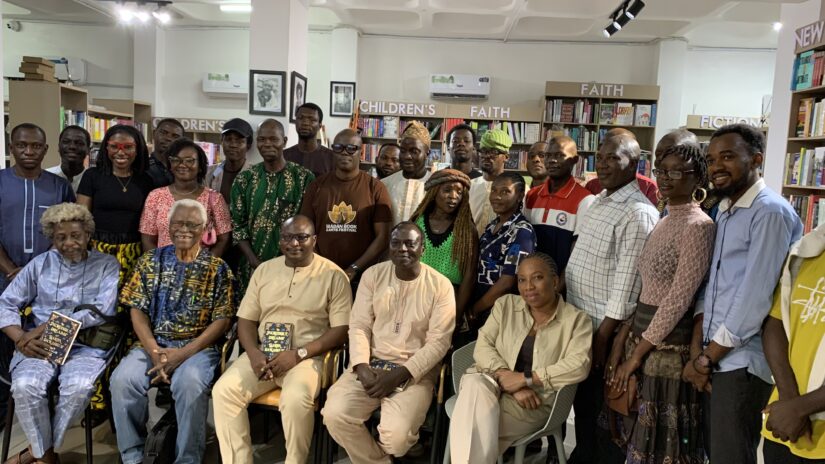
Pius Nsabe
Ibadan once again affirmed its place as Nigeria’s literary capital on Saturday, September 20, as writers, scholars, poets, and culture enthusiasts gathered at the Roving Heights Bookstore, Old Bodija, for a book reading and conversation with Navy Captain Umar Abubakar Sidi, author of the critically acclaimed novel The Incredible Dreams of Garba Dakaskus.
Sidi was engaged by the moderator, Poet Laureate and 2013 Winner of the Nigeria Prize for Literature, Tade Ipadeola.
The curator of the event, Femi Morgan, stated that Sidi is one of the few authors who place high premium on engaging readers across Nigerian cities. He noted that despite Sidi’s regimented work life as a soldier, he has been able to produce impressive works of poetry and a novel, while also traveling across major cities to hold robust conversations about culture, literature, and the arts.
Morgan further highlighted that Sidi’s novel The Incredible Dreams of Garba Dakaskus was shortlisted for the NOMMO Prize for Speculative Fiction and the Dublin Literary Award, while his poetry has twice been shortlisted for the Association of Nigerian Authors Prize, in 2018 and 2023.
Acknowledging the presence of the audience, he paid special homage to Professor Mark Nwagwu, Professor Sola Olorunyomi, and Ipadeola for remaining an inspiration and backbone for Ibadan’s intellectual fervor.
While moderating, Ipadeola remarked that Sidi’s work is impressive and aligns with the ideas of Mikhail Bakhtin, the cultural philosopher who emphasized broad experimentation in storytelling since the novel is not bound by strict rules or categories. He noted that the book caricatures “political animals” in modern society, delves into history, and explores cities.
He added that the Dublin Literary Award must have recognized Sidi’s work for its range, narrative force, and for the author’s bold development of the book itself as a central character.
Ipadeola also probed Sidi’s creative process, the centering of Africa in his novel within what he described as a globally contested landscape of narratives, as well as the surrealist philosophy that shaped Sidi’s poetry.
For Ipadeola, Sidi’s novel is a book he would have loved to write, as it explores tyranny, power struggles, civilizations, metaphysics, and psychological trauma. He praised Sidi’s publisher, Masobe, for taking a chance on such a novel, noting that many publishers would have expressed skepticism. He stressed that Masobe has begun to change the landscape of African publishing despite the challenges of capital and weak publishing systems.
In response, Umar Sidi revealed it took him six years to complete the novel. He explained that he was driven by the need to move beyond the predictable and linear storytelling trend he observed in many Nigerian novels. For him, a writer must stretch imagination, explore multiple possibilities of stories and voices, and broaden the reader’s mind.
Sidi cited Ben Okri and Italo Calvino as key influences, adding that he wanted to write a novel he himself would love to read. He noted that his novel was also inspired by explorations of Timbuktu and Africa’s underground cities of knowledge and civilizations. He lamented that subtle and blatant colonization had dealt heavy blows to such knowledge systems in places like Timbuktu, Sokoto, and Ife.

On balancing military life with creativity, Sidi said he adopted Salman Rushdie’s method of taking a hot bath to wash away the soldier and consciously become the writer each day. He added that coffee kept him awake after work hours to focus on his writing.
Turning to the publishing ecosystem, Ipadeola emphasized the urgent need for government investment in libraries. Mrs. Sylvia Oyinlola, a governance NGO expert, went further, urging individuals and NGOs to institutionalize libraries as part of their legacies instead of spending heavily on lavish parties. She stressed the importance of restoring respect and dignity for books, authors, and the creative ecosystem in order to elevate the value of creativity.
The event was graced by Professors Nwagwu and Olorunyomi; Oyinlola; Segun Ayoade, governance and brand strategist; Sogo Faloye, technology strategist and Chief Operating Officer of Fairchild Media; Mrs. Jane Orire, forensic criminologist; Servio Gbadamosi, poet and publisher at Noirledge; naval soldiers; lecturer and poet Mr. Waliyulah Tunde; students of the Institute of African Studies, University of Ibadan; as well as culture enthusiasts and advocates.
By the end of the evening, it was clear that Sidi’s The Incredible Dreams of Garba Dakaskus had sparked more than just admiration—it rekindled a conversation about storytelling, imagination, and the place of literature in shaping society.
